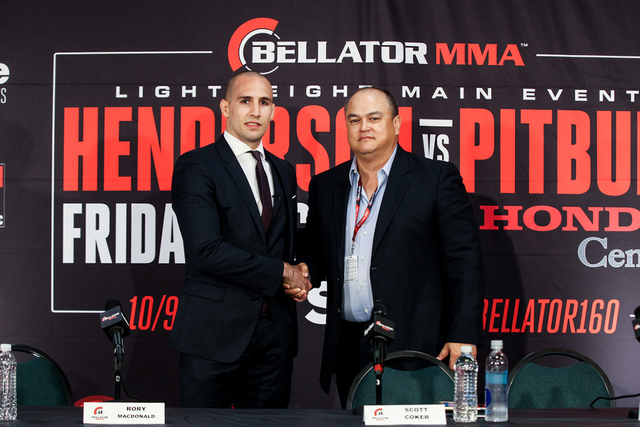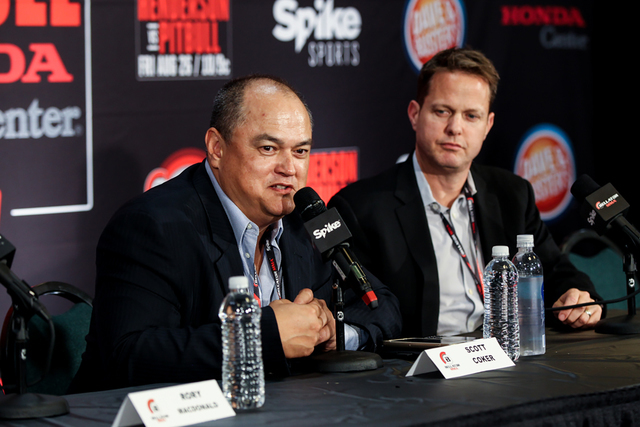A Q and A with Bellator president Scott Coker
Bellator MMA president Scott Coker has seen the mixed martial arts world from bottom to top.
He started Strikeforce and turned it into the unquestioned No. 2 organization in just five years, eventually selling to the UFC, where he was under contract for three years as part of the deal.
When that time expired, he took over Bellator, where he is trying to carve out a market share in the shadow of a UFC organization that was just sold for a whopping $4 billion.
Coker isn’t one to be intimidated, however. He has signed several big-name free agents after their UFC contracts expired, including former welterweight title challenger Rory MacDonald just this week.
Coker sat down with the Review-Journal before his organization’s show at the Honda Center in Anaheim, California, this week and discussed everything from competing with the UFC to signing their free agents to the so-called freak-show fights he has been criticized for promoting.
Q: How has your experience been since taking over Bellator in June 2014?
A: It’s been a lot of fun. There’s been challenges, but mostly it has been fun. I think we’ve done a lot of great work in the last two years. The roster is looking good, our sponsorships are looking good, the ratings have been strong. We’re starting to expand more internationally, which is important. We mapped out this game plan from the beginning, and I think we’re right on schedule.
Q: What was the high point for you during this time?
A: One was the November show we did when Tito Ortiz fought Stephan Bonnar. I really dug everything about it, especially the fighters and staff and everyone just walking in the building and seeing the scale of our setup. It was the first time we had all the screens and we were in a bigger arena and people knew this is what Bellator was going to look like now. It wasn’t the Bellator of old anymore. The other was coming back to (Strikeforce’s hometown of) San Jose and doing a show there. We had 11,000 people there. We had been out of the market for three years and they were hungry for a show. That was cool. I’m proud of what we’ve accomplished. Out tentpole shows all draw over a million viewers. We’re building a roster by developing some really talented young guys and blending them with big-name veteran signings.
Q: What about the low point?
A: Taking over an organization that is already moving forward and operating was very different. It’s not like starting from scratch like I had done before. I’d say the toughest part was to step in midstream and get the thing headed in the direction I wanted. But obviously the situation we had in February when (Dhafir “Dada 5000” Harris) went to the hospital really affected us. I don’t ever want to see anyone hurt. Personally for me, (Kevin “Kimbo Slice” Ferguson) passing away was the toughest because he was a friend, and the last time I saw him he was as healthy as can be. But business and life can mirror each other. We’ve had some great successes and some real terrible bumps and bruises along the way. For me, it’s part of life.
Q: You are unquestionably No. 2 in the American MMA landscape behind the UFC. Is the goal to find your niche or somehow take aim at that top spot?
A: My goal is to build this company as big and fast as I can while maintaining a good foundation. Every day when I wake up, I’m not thinking anything other than that. I’m not thinking of any other leagues. I’m really not. I’m thinking of what can I do to move Bellator forward. I’m thinking of what we need to fix, what fighters we should sign, where we can expand internationally. There’s a lot of work on the table every day. So really, competing with anybody is not the key focus. The key focus is continuing to build every day, and if that takes us somewhere that’s great, then it’s a great victory. And I’m sure they don’t wake up thinking about other leagues either. You can only control your own destiny. I will say this, though. It’s a very unusual time for (the UFC). They sold the company, Lorenzo (Fertitta) is out. Anytime a new ownership group comes into a company, there’s always going to be challenges. I think it’s going to be an interesting time in the sport.
Q: You have gone after some of their free agents lately, though. So that’s more just about who becomes available that fits your business plan more than firing shots across their bow?
A: Every free agent that has approached us in the last year, I’d say we signed 80 percent of them. They approached us because we can’t go after contracted fighters and until they’re truly free, we’re not going to have a conversation. I’m still a fan of the sport. I’m watching the fights. I’m a fan of these guys. When it comes time to talk about Bellator business, there’s a whole different mindset that has its own place in my mind. But it’s a whole different mindset. How successful we want to be is going to be based on us. That’s what I think. We’re going to be engaged with whoever is available, as you’ve seen. But we’re going to build this thing from the ground up and buy free agents from the top down. We already have a great roster now. It’s really exciting right now.
Q: Many fighters have complained about the UFC’s deal with Reebok and how it limits sponsorship opportunities. How important has that been to opening the door to signing some of these guys?
A: That has been a big factor. A lot of fighters want that freedom to have their own sponsorships. When you think about it, how do you make independent contractors wear a uniform? That just seems strange to me. These guys are all independent contractors. They have a fighter’s mindset and they want to have certain freedoms. I think that’s important to them.
Q: Along the same lines, there has been a lot of talk lately about the fighters unionizing. That has been more at the UFC level for now, but it could impact Bellator and you’ve been around the sport long enough to see these kind of efforts before, so what are your thoughts?
A: I’m not a union guy in the sense that I know a lot about how they operate. But I know figthters. They are individual athletes. This is not a team sport. I think it’s going to be hard to say, ‘Hey, do you mind not fighting on Saturday and walking around the arena with a picket sign instead?’ I just don’t see it. These guys fight twice a year. They have to make their money now and you’re asking them to potentially go as far as to strike for the guys at the lowest end of the pay scale who have just signed. I’m just telling you right now. I don’t see it.
Q: What was your first thought when you saw the headline that the UFC had sold for $4 billion?
A: Oh, I was happy. It puts a stamp on the credibility of the sport. The respectability the sport got when that story came out made it real not just to us that love the sport, but to Wall Street. It sent a message that you can be in the mixed martial arts business and it can be a very profitable enterprise. It’s a good investment. I told my guys we should be popping champagne with (UFC executives) right now. It just says this can be achieved. Even if you achieve half, or even 25 percent, of that, it’s still a big number. It’s something that everyone in this business should be happy about.
Q: You have taken criticism for your willingness to put on the so-called “freak-show fights.” How do you respond to that?
A: Simple. I call them fun fights. That kind of came from my experience in Japan. I went to a show in Japan in the early 2000s and there was a fight on there between Bob Sapp and Antonio Rodrigo Nogueira. Bob was just a football player turned pro wrestler who had no idea what he was doing and Nogueira is a skilled jiu-jitsu guy and Sapp almost beat him. Later that year, Bob goes and knocks out Ernesto Hoost, one of the most talented champions in K-1. Then he knocks him out again. I asked the owner of K-1, why do you do these fights, the same way I get asked these questions now. He said, “When Ernesto Hoost fights Peter Aerts or Jerome Le Banner, the fans watch. But when we have (sumo star) Akebono fight Royce Gracie or Bob Sapp fight Nogueira, the whole country watches.” There’s interest beyond just the hardcore fans. We’re on Spike TV and it’s an entertainment channel. We’re an entertainment property. Look, 99 percent of the fights we do are for the hardcore fight fans. But if we do a couple fights a year that have a fun element to it or something outside the box, I think that’s OK. We’re bringing in an audience that normally wouldn’t watch any MMA fight.
Q: So what for you is the next frontier for Bellator MMA?
A: Definitely continued international expansion. Viacom owns channels all across the world. Bellator went from being in 80 countries to 145, and these international operators are saying they want us to bring the product to them. They’re saying, ’We’re showing you on TV and getting good ratings, but we want you to come here.’ That’s why we’re going to Tel Aviv, Argentina, Florence, torino, Budapest and all these other places. That’s going to continue. I think that’s going to be big business for us.
Contact reporter Adam Hill at ahill@reviewjournal.com or 702-224-5509. Follow @adamhilllvrj on Twitter.




















